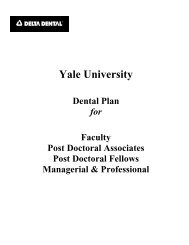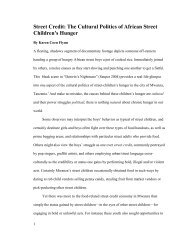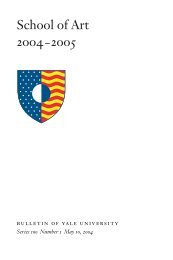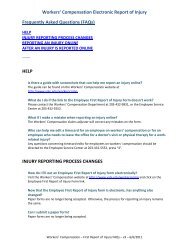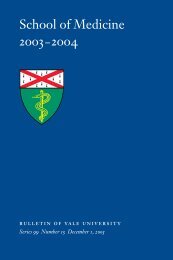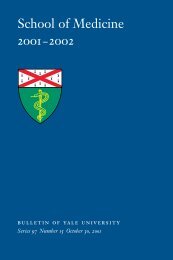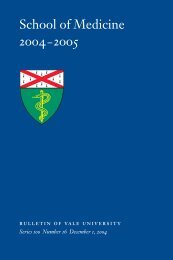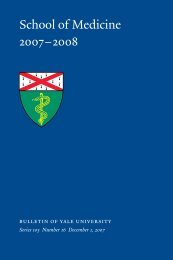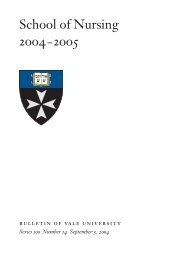98 School of Nursingdevelopment are integrated into the understanding of mental disorders. These includepsychodynamic, relational, and cognitive perspectives. Required for all psychiatric–mental health <strong>nursing</strong> students in the first year of specialization. Open to others withpermission of the instructor. Two hours per week. D. Olsen.661b, Models of Treatment. 1.5 credit hours. This course builds on 657a, MentalHealth Assessment Across the Life Span. It is designed to assist the student in comprehensivetreatment planning and understanding the dynamics of the therapeutic relationshipin implementing interventions. Students utilize models of care specifically suited toindividual patients and patient problems identified in advanced psychiatric <strong>nursing</strong> practice.Course content is arranged in four sections: treatment planning, therapeutic contracting;directive/problem-focused models of care; psychodynamic/evocative modelsof care; biologic models of care. Required for all psychiatric clinical nurse specialist studentsin the first year of specialization. One and one-half hours per week. J. Pasacreta.7ooa/b, Child Care Health Consultation. 1 credit hour per term. This elective clinicalcourse provides pediatric nurse practitioner and family nurse practitioner studentswith the opportunity to gain knowledge and experience in child care health consultation.The course provides a forum for examining health and developmental issues of youngchildren in early care and education settings, the evolving role of the advanced practicenurse child care health consultant, and opportunities for health promotion and familyintervention, as well as policy implications. Open to pediatric nurse practitioner andfamily nurse practitioner students in the final year of specialization. Open to others withpermission of the instructor. Two hours per week in a child care setting and two hoursevery other week of clinical conference. A. Crowley.7o4a/b/c, Master’s Independent Study. This elective study is initiated by the studentand negotiated with faculty. The purpose is to allow in-depth pursuit of individual areasof interest and/or practice. A written proposal must be submitted and signed by the student,the faculty member(s), and the appropriate specialty director. Credit varies accordingto the terms of the contract.7o9a, Legal Issues in Nursing Practice. 1 credit hour. This elective course provides thestudent with information about the legal regulation of advanced <strong>nursing</strong> practice andabout selected clinical practice situations. Readings include cases, statutes, and regulationsfrom the legal literature as well as articles from the fields of law, medicine, and <strong>nursing</strong>.Instruction in the use of the law library is provided. Two hours per week for eightweeks. S. Cohn.713a (EMD 557a), Public Health Issues in HIV/AIDS. 2 credit hours. This is an electiveintroductory broad-based course for students of all levels interested in the HIV/AIDSepidemic. The course covers pathogenesis, clinical care, natural history of infection, laboratorytesting, transmission, and prevention of HIV/AIDS, and is designed to give studentsa general, comprehensive understanding of HIV/AIDS issues. The course is recommendedfor students beginning work in public health or HIV/AIDS, or for those whowish to expand their specialized knowledge of HIV/AIDS. Offered through the Departmentof Epidemiology and Public Health. Two hours per week. K. Khoshnood.
Course Listings 99715a/b, Stress Reduction and Relaxation. 1.5 credit hours. This elective eight-weekcourse offers intensive training in mindfulness meditation: tuning into the breath, andlearning to experience life more fully, one moment at a time. There is instruction in thebody scan, hatha yoga, awareness of breathing meditation, walking meditation, andeating meditation, as well as mindfulness of interpersonal communication and otheractivities of daily life. The primary goal of the course is to develop a daily meditationpractice in order to handle personal, academic, and professional stress more effectively.The secondary goal of the course is to explore the use of mindfulness meditation in thehealth care system. Course content is the same for both terms. Two hours per week, onesix-hour daylong session on a weekend. Open to all graduate and professional studentsat <strong>Yale</strong>. Not available for audit. B. Roth.717a, The Contexts of Care I. 2 credit hours. This course provides students an integrativeexperience in applying organizational, operational, financial, and policy contextsof practice. The course combines experiential learning with lectures and Web-basedinstruction. Three modules define the course content: organizational diagnosis andgroup relations (taught in a one-day intensive session); operations management andfinance; and health policy. Required in the final year of specialization for all students,except for those in the Nurse-Midwifery specialty who take it in the first year of specialization.J. Krauss, coordinator; S. Cohen, P. Milone-Nuzzo.717b, The Contexts of Care II. 2 credit hours. Nursing as advanced practice and asmanagement occurs in contexts that inevitably influence practice. In this course, actualcases are used for analysis of the practice contexts, which include organizational structure,reengineering, managed care, data systems, inter- and intraprofessional issues, politics,finance, planning, regulation, ethics, law, and the courts. Opportunities for <strong>nursing</strong>to extend practice into new forms and environments are discussed as the new contexts forcare. Cases are supplemented by lectures and assigned readings. Required in the finalyear of specialization for all students except those enrolled in the Nurse-Midwifery specialty.Two hours per week. J. Krauss, coordinator; L. Ament, E. Gustafson, L. Price.719a (HPA 564a, MGT 659a), Integrated Clinical/Financial Information Management.2 credit hours. No matter what the regulatory or payment environment is, managementof health care delivery systems depends upon data. This elective course providestheory of information management and applications using real data. The courseuses a powerful local resource, the work of the Resource Information ManagementSystem (RIMS) at <strong>Yale</strong>–New Haven Hospital, as the basis for learning about the clinical,financial, operational, and technical inputs to a management information system. Theuses and applications of information in planning, developing, operating, negotiating, andevaluating health care service is stressed. Recommended for <strong>nursing</strong> management andpolicy students, management students at the Department of Epidemiology and PublicHealth, and School of Management students interested in health care management.Open to others with permission of the instructors. Two hours per week. D. Diers,S. Allegretto.
- Page 1 and 2:
School of Nursing2002-2003bulletin
- Page 3 and 4:
School of Nursing2002-2003bulletin
- Page 5 and 6:
RayTompkinsHouseLynw od PlaceHi lsi
- Page 7 and 8:
ContentsA Message from the Dean 7Ca
- Page 9 and 10:
A Message from the DeanCatherine Ly
- Page 11 and 12:
The President and Fellows of Yale U
- Page 13 and 14:
Faculty 11faculty* Ivy Marie Alexan
- Page 15 and 16:
Faculty 13Virginia Henderson, 1897-
- Page 17 and 18:
Faculty 15Ronald Angoff, m.d., Asso
- Page 19 and 20:
Faculty 17Stephen Malcolm Bowers, m
- Page 21 and 22:
Faculty 19Alyson Bochow Cohen, m.s.
- Page 23 and 24:
Faculty 21Kathleen Marie Demers, m.
- Page 25 and 26:
Faculty 23Carolyn Miller Federici,
- Page 27 and 28:
Faculty 25Marci Ann Garafalo, m.s.n
- Page 29 and 30:
Faculty 27Robert Wentworth Hill, m.
- Page 31 and 32:
Faculty 29Linda Kowalczuk, m.s., Cl
- Page 33 and 34:
Faculty 31Thomas J. McMahon, ph.d.,
- Page 35 and 36:
Faculty 33Moira Kathleen O’Neill,
- Page 37 and 38:
Faculty 35Monica Roosa-Ordway, m.s.
- Page 39 and 40:
Faculty 37Barney S. Spivack, m.d.,
- Page 41 and 42:
Faculty 39Elizabeth Arquin Walker,
- Page 43:
Faculty and Staff 41Elizabeth Willi
- Page 46 and 47:
44 School of NursingIn November 199
- Page 48 and 49:
CentersCenter for Excellence in Chr
- Page 51: Academic ProgramsPaula Milone-Nuzzo
- Page 54 and 55: 52 School of Nursinggeneral enrollm
- Page 56 and 57: 54 School of NursingInternational s
- Page 58 and 59: 56 School of NursingArticulated Mas
- Page 60 and 61: 58 School of Nursingthe specialty a
- Page 62 and 63: 60 School of NursingYear OneRequire
- Page 64 and 65: 62 School of Nursingadult, family,
- Page 66 and 67: 64 School of NursingDuring the fina
- Page 68 and 69: 66 School of NursingYear TwoRequire
- Page 70 and 71: 68 School of NursingYear OneRequire
- Page 72 and 73: 70 School of NursingThe course plan
- Page 74 and 75: 72 School of Nursingand advanced pr
- Page 76 and 77: 74 School of Nursingpsychiatric-men
- Page 79 and 80: Doctor of Nursing Science Programai
- Page 81 and 82: Doctor of Nursing Science Program 7
- Page 83 and 84: Doctor of Nursing Science Program 8
- Page 85: Postdoctoral Training Program 83qua
- Page 88 and 89: 86 School of Nursing[923a, Current
- Page 90 and 91: 88 School of Nursing512c, Clinical
- Page 92 and 93: 90 School of Nursingresearch plans.
- Page 94 and 95: 92 School of Nursing564a, which foc
- Page 96 and 97: 94 School of Nursingper week for ac
- Page 98 and 99: 96 School of Nursingpractitioner, f
- Page 102 and 103: 100 School of Nursing721a/b, Schola
- Page 104 and 105: 102 School of Nursingmanagement of
- Page 106 and 107: 104 School of Nursing769a, Advanced
- Page 108 and 109: 106 School of Nursing8o3a/b, Oncolo
- Page 110 and 111: 108 School of Nursing827a, Pathophy
- Page 112 and 113: 110 School of Nursingassumption und
- Page 114 and 115: 112 School of Nursing9o3a, Measurem
- Page 116 and 117: 114 School of Nursing[921b, Seminar
- Page 119 and 120: General Informationtuition, special
- Page 121 and 122: General Information 1192. If the ch
- Page 123 and 124: General Information 121As an altern
- Page 125 and 126: General Information 123include Ethe
- Page 127 and 128: General Information 125In addition,
- Page 129 and 130: General Information 127Eligibility
- Page 131 and 132: General Information 129The School o
- Page 133: General Information 131OISS by subs
- Page 136 and 137: 134 School of NursingThe Connecticu
- Page 138 and 139: 136 School of Nursingmedical and pe
- Page 140 and 141: 138 School of Nursingcare, and home
- Page 142 and 143: 140 School of NursingConnecticut Ch
- Page 144 and 145: 142 School of NursingInternal Medic
- Page 146 and 147: 144 School of NursingRehabilitation
- Page 149 and 150: University ResourceslibrariesThe ma
- Page 151 and 152:
University Resources 149may use the
- Page 153 and 154:
Candidates for Degree of Masterof S
- Page 155 and 156:
Master’s Degree Candidates 153Sar
- Page 157 and 158:
Distribution of GraduatesAlumni rec
- Page 159 and 160:
The Work of Yale UniversityThe work
- Page 161 and 162:
Index of CoursesAdult Development:
- Page 163 and 164:
Index of Courses 161Oncology Sympto
- Page 165 and 166:
The University is committed to basi




